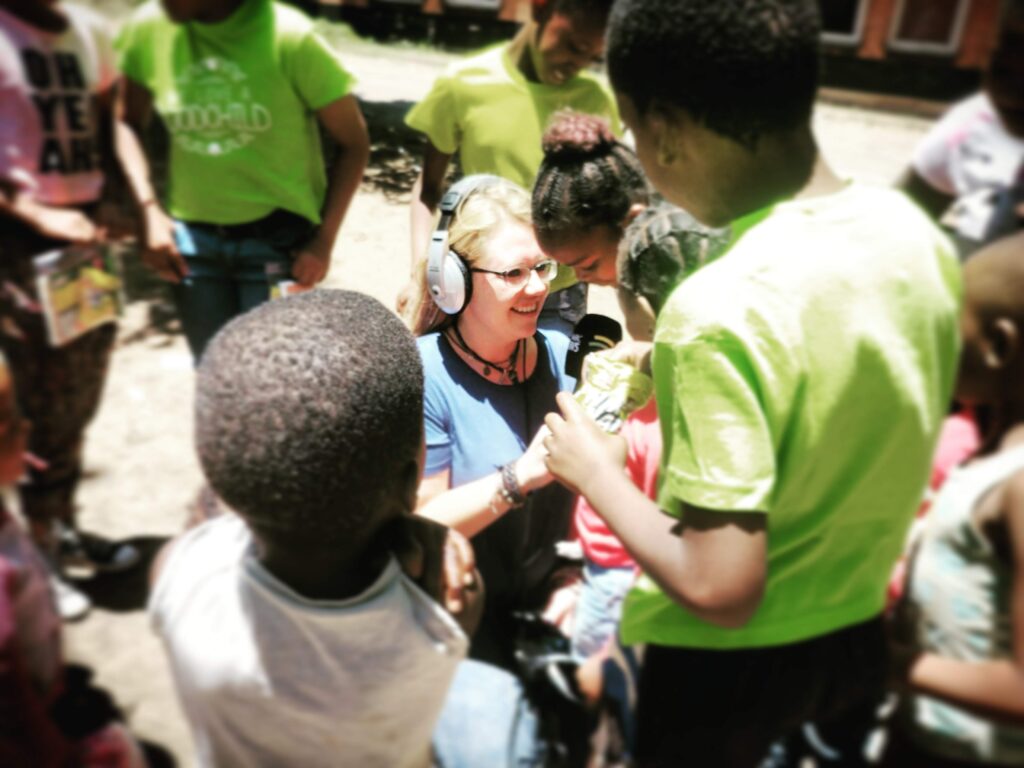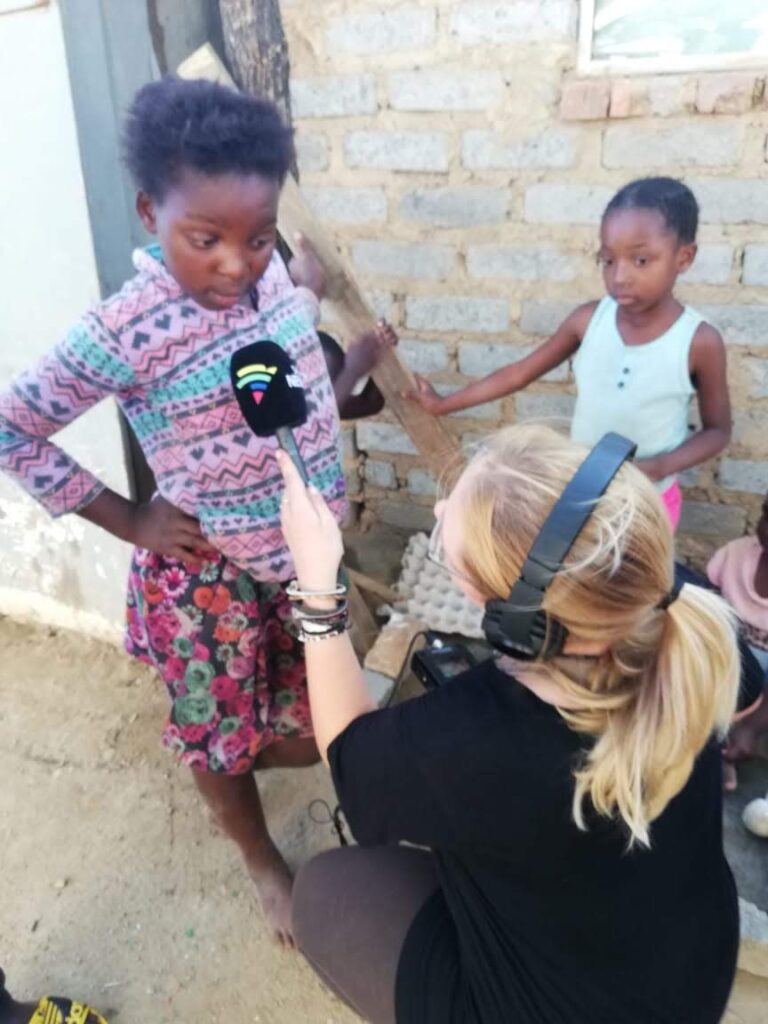
In celebration of Youth Month, we sit down with award-winning reporter Jamaine Krige to discuss the complexities and ethical considerations of reporting on children. From overcoming initial fears to ensuring the amplification of children’s voices, our guest shares insights into navigating legal challenges and the importance of responsible journalism. Discover the impactful stories that highlight young voices and the ongoing efforts to bring about change through ethical reporting.
What are the challenges you have encountered when it comes to reporting on children in the media?
I think many of the obstacles that we encounter when reporting on children are self-imposed. There are legal challenges and ethical challenges, but the main thing that held me back at the start of my career was fear! I recognised that the stakes were much higher when reporting on the most vulnerable members of society, and I was terrified that I would do something that could negatively impact them. I asked myself whether I was allowed to tell stories about children, instead of asking myself HOW I could tell these stories in an impactful and ethical manner, despite the challenges. I eventually overcame this fear through empowering myself with skills and knowledge about what was allowed, what was not allowed, and how I could get creative to ensure that children’s voices were amplified rather than silenced when it comes to issues that affect them. I also think we often feel it is our job to give vulnerable groups like children a voice, forgetting that they have voices. Our job is just to amplify those voices and ensure that they have a platform to be heard. Another challenge is the lack of resources in our newsrooms, which means that we do not often have the time needed to focus on and do justice to a child-focused story. This is especially difficult when news managers and editors do not recognise the value or importance of this type of reporting.
“We often feel it is our job to give vulnerable groups like children a voice, forgetting that they have voices. Our job is just to amplify those voices and ensure that they have a platform to be heard.”
How do you ensure ethical and responsible reporting when it comes to issues relating to young people and children?
Information and education are key. Know the laws and regulations that guide ethical reporting on children. The best interest of the child must guide everything we do, and that means the best interest of the specific child sitting in front of you at that moment. While the intentions might be noble, journalists often sacrifice individual children on the altar of the greater good, thinking that their story might have a broader impact. Journalism is not a final product; instead, it is a process. To ensure ethical reporting, I think it is important to include children in as many steps of that process as possible, ensuring that they have agency, autonomy and power over their own voices, their own stories and the narratives about the issues that affect them. Informed and ongoing consent is key, as is active listening. Self-awareness is important to ensure that you are not overpowering younger interviewees. This is why is is important to explore the power dynamics at pay and do what you can to minimise these. When we help children amplify their voices, we allow them to discover the power that their voice holds. We empower them to speak up. And that is the first step of bringing about change.

What kind of stories have you been focusing on and have noticed that the media focuses on when it comes to children and young people?
Facilitating the telling of stories about children and ensuring that they play a central role in shaping that story and its direction is one of the most exhilarating, tiring, frustrating, amazing and rewarding things you will ever do. That is why I am now involved in empowering journalists to do just that through training and mentorship.
When it comes to children in the media, we often write about what has been done to them instead of focusing on what they are doing. Reporting is not nuanced, and they are painted either as victims or offenders, cautionary tales or prodigies. This is not reflective of the lives of most children, who have opinions, thoughts and feelings about what is happening in the world around them. In our reporting we also focus on events and not issues. This is especially true when it comes to reporting on children. We will write about individual cases where children’s rights are infringed upon without delving deeper into the issues that underpin children’s lived realities. This means we often miss out on the opportunity to take a solutions-focused approach. When done right, journalism should be an act of empowerment. Instead of telling stories to them, or about them, we should enable them to tell their stories, and then actually allow them to tell those stories. Not just because they make up most of our population, but because they are, quite literally, the future of our society. Empowering children to speak up, and amplifying their voices, is as important, if not more important, than amplifying the voices of other marginalised groups. Because in each marginalised group that you can think of, there are children.
When we write about the issues affecting children without getting their input about solutions, we are in effect perpetuating a cycle where children are further disempowered. Each person is totally capable and entitled to tell their own story. We often recognise this with experts and witnesses and the sources we interview, yet when we do stories about children then we don’t acknowledge this autonomy and competency.
“We often write about what has been done to them instead of focusing on what they are doing. Reporting is not nuanced, and they are painted either as victims or offenders, cautionary tales or prodigies.”
What are some of the stories which you think need to be told more?
I think we need more issue-based reporting, and a stronger focus on solutions. It’s not just about telling more child-focused stories, but recognising that any story, regardless of the beat you are covering, can be a child-focused story. Children were impacted and will be impacted by the elections and their outcomes. If you are writing about water, children are affected. If you are covering climate change, there are children impacted. Whether you are reporting on health, economics, politics, local or national government, crime… children are there, and they are impacted. More than being impacted though, they have opinions about what is happening and are possibly even acting for change. We need to do more stories about children, but more importantly we need to see that children are included in the stories that we do every day. We often speak to adults about prominent topics in the news cycle – we do vox pops or ‘voxies’ about elections, service delivery, education, the cost of living. Why don’t we do the same with children? If we’re telling stories for change – today and for future generations – then we owe it to the primary stakeholders of tomorrow to include them in history’s first draft.
“By creating accessible news content using new media methods, we can effectively engage new audiences and expand our existing audience base.”
Is there an effort to have more youth represented in the media?
I think strides are being made but I also think a lot more still needs to be done. Media Monitoring Africa and Wits University partner host an annual Reporting on Children in the Media course, As the course coordinator and lead facilitator on this course, we aim to empower journalists with the skills and knowledge needed to effectively and ethically report on children. I am also thrilled to announce that we have just expanded the training and completed our first RCM Africa course for journalists on the rest of the continent. To see real change though we also need commitments from news managers and news organisations. Both the media industry and other sectors can learn a lot from them and benefit from enabling young people to speak out about the issues that affect them, and then actually listening to how they would like those issues to be resolved.
Has social media impacted on the way the youth are represented in the media and how their stories are told?
Definitely, and I think social media has also blurred the lined of ethical reporting for many journalists. We often try to compete with the information we see on social media, forgetting that the people or organisations who post videos, photos or stories on these platforms are not held to the same standards as we are, and are not governed by the same laws or codes of ethics. Just because a child’s photo is being circulated on social media does not mean it is legal or ethical for us as journalists to do the same. As practitioners and as an industry, we are held to a higher standard, and must keep the best interest of the child at the centre of what we do, while actively working to minimise harm.
Here, digital and media literacy initiatives have a role to play to ensure that children’s engagement in the online space is not only meaningful and informative, but also safe.
Do stories have to be told differently to accommodate and reach children and young people?
There is a business case to be made for reporting on children. In South Africa, more than a third of our population is below the age of 18. These are our audiences of tomorrow, but they are also our audiences of today. Children also have the right to be informed and educated, and to access information about things that affect them. The techniques that media practitioners use to engage younger audiences can also be used to reach wider audiences. For news consumers under the age of 35, social media stories and reels are the most popular way to consume content. By creating accessible news content using new media methods, we can effectively engage new audiences and expand our existing audience base. Research by Media Monitoring Africa has found that children, like many adults, want solution-focused reporting that contextualises the news cycle and makes it relevant to their own lived realities. Children are interested in and engaged with current affairs – they just need to empowered to be able to participate in a meaningful way.
